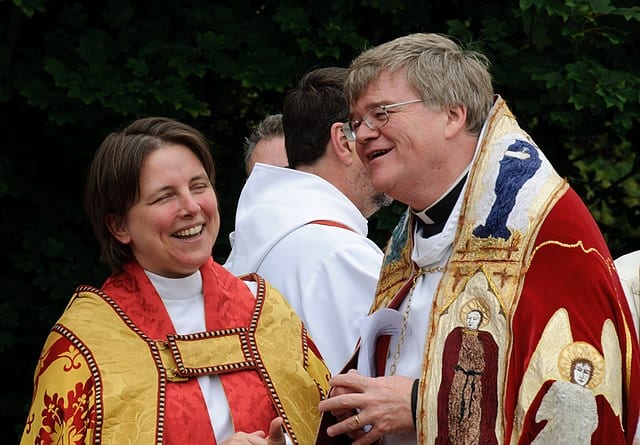
Karin S. Tate is a Catholic and a PhD Candidate in History and Classics. She stopped by my blog to offer a critique of my paper, Is Male-Only Priesthood Sexist? (2007). Her words will be in blue. I will add further rounds of dialogue if / as they occur.
*****
This idea of “roles” in the Church is not without merit, I think, but not in the way you represent it. Rather, look at scripture – which admonishes that we each serve according to her/his abilities and talents . This is how God intends us to work—not by the dictates of gender but as human persons each with an intrinsic, God-given dignity and equality. “There is neither Jew nor Gentile, neither slave nor free, nor is there male and female, for you are all one in Christ Jesus.” The Church is not reflecting this right now, and it is being prevented from doing so by thinking that is, I’m sorry, self-serving when employed by men who do not want to share the ministry.
This, of course, is part of a larger, more complex and nuanced discussion than you represent it as being. I disagree with this interpretation of what it means that Christ was a man, and what “appropriate roles” God intends for women in the church. I think that you (and the Church) might take more time to think about the implications of all your arguments, especially with regards to the equality of human beings, male and female. Is the male only priesthood sexist? Absolutely, yes, and one day the Church’s eyes will be opened, the scales will fall off, and it will see. But first we need to rid ourselves of this notion that God chooses that women have less access to the full expression of their servanthood, their baptism, and their priesthood than men (1 Peter: 2.5-9). Consider Mary and Martha. Mary, sitting at the feet of Jesus, has chosen the better part, Jesus says, and Martha, working away in the kitchen, has chosen hers (Luke 10). Both characters here are female, but that is often ignored. You would have us all be Marthas, and ignore that Jesus called some women to be Marys. Even more, he said that Mary’s part should not be taken from her.
Thanks for commenting. What denomination are you, Karin?
I don’t see how our view can automatically be regarded as “sexist.” I would have to see how you interact with my arguments in order to understand why you would think that (i.e., a true back-and-forth dialogue, which I would love to do). But you chose not to do that. Nor is differential gender roles a denial of equality in the least.
Hi Dave. I’m Catholic, and I did write a much longer engagement with your arguments but only sent the last little bit. Like I said, this is a more complex issue that needs more nuancing and I don’t think it can be done justice in this venue. I would also appreciate a back-and-forth. There’s a lot going on in each argument you present, and a reasoned, respectful reply would I think require a step-by-step examination. I am just not sure the comment section of a blog is the place.
It’s designed (at least on my blog) to be the perfect place for interaction with my arguments. We could do email, but in any event I would want to put the whole thing up as a dialogue (as I always do), so it wouldn’t be “private” in either scenario. Thus, why not here?
Now, I’m curious about what was in the “much longer” reply! :-)
The first rather obvious question is: why did Jesus choose all men for His twelve disciples? Was He (God incarnate) a sexist, too? Also, you appeal to the usual Pauline passage [Galatians 3:28] about male-female equality (I love that one); yet the same Paul in talking about bishops, casually assumes that they will always be men, by stating that they should be a “husband of one wife” (1 Tim 3:2, RSV); and says the same even about deacons (1 Tim 3:12).
By the way, I’m not automatically opposed to women deacons. I think it could quite possibly be a very good thing. But I will accept whatever Holy Mother Church decides about that.
This may be the first obvious question to you, it is not so for me. But ok, let’s start there. Why did Jesus choose all men for his twelve? Was/Is God incarnate sexist?
No. Absolutely not. He is perfectly holy, and sexism (properly defined) is wrong, so therefore (i.e., after granting the prior premise) He is not sexist.
Well, first, I do not presume to know the mind of God.
Neither do I. But we can analyze and ponder how He he revealed Himself in Holy Scripture and through the Church that He established.
I do know that throughout the Bible God deals with humans as He finds them. . . . The whole story of scripture is of God taking humans where they are at, which is never at God’s level, obviously, and inviting them to more. God meets us where we are.
I agree. But He does so in a manner that is not fundamentally compromised, self-contradictory or “two-faced.”
Do you think that God endorses murder because he brought down the walls of Jericho or killed the Egyptians by closing in the water?
I would call that judgment, not murder. It’s a species of “just war” if you will, which is fully permitted and not inconsistent with God’s character because He is the judge of humankind.
Enter Jesus into first century AD Judea. Here, God met the people where they were at, patriarchal society and all. Was that His endorsement of that society? No. So I have to conclude that Jesus chose 12 men as his main disciples because that was what it took to meet those people where they were at, to get His message out. Not to put too fine a point on this, if Jesus had chosen women in the context of that time, he would have been considered a mad man. He would have been laughed out of the synagogues and temples, and his female followers raped and harassed. I do not think that that means that Jesus thought “oh yeah, this is the way it should be.” But He lowered Himself and became man.
I think this is about the best argument you could have for your position, and indeed, I have argued similarly (twice) with regard to slavery, in response to atheist charges that the Bible and Christianity were either pro-slavery or lax on the matter.
I think that ultimately, however, your position breaks down into several self-contradictory pieces. We both agree that God is holy and not a sexist (I am assuming). So we have to interpret the data that is provided in the inspired and infallible revelation of Scripture (that I am also assuming that you accept, or else that is a huge can of worms itself, if you do not).
So you have to explain why both Jesus and Paul say and do things that seem contradictory (granting your position). As I already noted, you cited Paul’s scripture about “no male and female.” But he also no doubt expresses other things you would reject as sexist. And it can’t all be explained by “gradual / progressive revelation.” So this forces you logically to have to pick and choose which portions of Scripture you like and think are true, and which you think are perhaps added later by a bunch of chauvinist / sexist men with an agenda.
But therein lies one of your problems. There is no consistent and non-arbitrary way to pick-and-choose in such a manner from Scripture. Jefferson tried to do it by taking scissors to all the miraculous elements of the stories of Jesus. But it can’t be done. If you do that, it turns out there there is no Jesus at all: including not a Jesus Who rose from the dead and conquered death, or died in a way that supernaturally atoned for our sin.
It’s like peeling an onion. There is no core, like an apple. You keep peeling and it ends up with nothing at all. Atheists use this method of pick-and-choose and claims that stuff was “added later” to the Bible. But what they never do is provide a consistent methodology for explaining how they know this in any particular instance. I know, because I have engaged in probably well over a hundred online debates with atheists by now.
So this is one major problem, as I see it, with your position. There is another major one that I will discuss in due course.
As for scripture assuming bishops and deacons are men—I study ancient texts and ancient male authors always use the male as the default assumed sex. A crowd of men and women is “men” or “brothers”.
That’s not always the case. I did a quick search in RSV of “men and women” and found 25 matches.
I also found eight NT instances [if my math is right] of “sister” used in a non-literal fashion (i.e., not as a sibling; in the “sister in Christ”. sense).
Were there female bishops?
No.
What is the evidence?
Good question!
There is supposedly little evidence for women deacons, for example, and what there is, is hotly debated.
Romans 16:1 I commend to you our sister Phoebe, a deaconess of the church at Cen’chre-ae,
What exactly this meant, is debated.
I do know that it is a common fallacy to think that absence of evidence is evidence of absence. It is not. Men have written history and have excluded women almost completely from their telling. Other problems present themselves when we look at how the evidence that does exist (I’m talking broadly of female action in the ancient world now, not about bishops) has been dismissed out of hand, misinterpreted, or ignored by male academics working from their own biases.
That’s true. But this gets us to what I believe is a second serious flaw in your analysis. Catholics believe that God the Holy Spirit guides His Church, and protects it from falling into error. We believe that Holy Mother Church is, therefore, both infallible and indefectible (in the positions that it binds its adherents to). This Church has always held that priests and bishops are confined to men. And it does so because 1) that is how Jesus set it up, and 2) because the priest literally represents Jesus Christ, as an alter Christus.
So you say that the absence of women priests is clearly sexism. This would mean that both God’s character and His power are implicated: that He couldn’t guide His Church so as to progressively incorporate women priests and bishops, via development over time: just like everything else developed (not evolved): including even the doctrine of Christology and trinitarianism. Development involves no change of essential characteristics.
So why hasn’t this happened? Well, because such teachings were part of the original apostolic deposit, and they can’t change; they can only consistently develop.
But even prior to that, you have to explain why it is that you automatically assume that a male-only priesthood is sexist and somehow contrary to gender equality. There are all sorts of roles that are unique to one gender. I can’t be a mother, as much as I try, no breast-feed. Those things are confined to women. I can’t experience the wonders of bearing a child in my own body for nine months. Why would you assume that because the priesthood is a thing confined to males, that this is somehow denigrating to women? As I noted in my paper above, there are now several Doctors of the Church who are women, and the Blessed Virgin Mary is the very highest, most sublime human being who ever lived, and venerated as such.
Are we to believe that a parish priest is of a higher stature than St. Teresa of Avila or Mary the Mother of Jesus? It’s absurd. This being the case, I don’t see how “sexism” could possibly be asserted. I could see how it possibly might in a Protestant denomination that doesn’t revere Mary and has no women saints (let alone Doctors), but not in Catholicism.
So rather than get hung up on this, let’s talk about how Jesus treated women. If Jesus spoke with the Samaritan woman at the well (John 4), why not read that as Jesus’ endorsement of women as worthy of full participation in the church?
Yes, I do read it that way. Jesus treated women with immense respect and appreciation.
He instructed Mary Magdalene to go tell the men about the resurrection (John 20:17). Why is that not read as further proof that Jesus assumed full female participation?
It is read that way. But it is no proof of a female priesthood. It’s not because whenever the unique roles of priests are discussed, it is always with reference to men only; for example, forgiving sins of others (absolution). This was discussed with His disciples, because they represented the future priests. We’re also told (i.e., we laypeople) to forgive each other any sins, which included women, but this was a non-formal, non-sacramental meaning.
Because of human failing; because of sexist assumptions.
Not necessarily at all. That is the presupposed filter you apply to it. But you have to explain that inspired Scripture and a divinely guided Church can bring about this result: by means of a perfect, holy, loving God.
If God’s punishment for Eve (woman) was that she experience pain in childbirth and be subject to her husband (Genesis 3), that should be proof that women being subordinate to men is the result of the Fall; it is not how God wants it to be.
It depends on what one means by subordinate. Jesus was subject to His Father and also even to Mary and Joseph. Scripture teaches that. Does it follow that He is lesser than them? No, obviously not. Subjection is not inferiority. Jesus also said that it is greater to serve. St. Paul tells women merely to “respect” their husbands. But what does he tell the husband? They have to love their wives as Christ loved the Church: a far greater service and burden (if we must compare).
Jesus came to redeem humanity from sin, so why would part of that not be restoring men and women to their equal relationship on earth?
It is part of it. I deny your premise: that a male priesthood is sexist.
That’s why we can say that in Christ there is neither slave nor free, male nor female, but all are one in Christ Jesus. Jesus is the remedy for sexism, or ought to be.
Yes He is. You grant that Jesus treated women well. Therefore, if the male priesthood is inherently sexist, then the Holy Spirit certainly would have brought it about through history that women could be priests, too. But it hasn’t happened, either in Catholicism or Orthodoxy (which also possesses apostolic succession). Where it has come about in Christianity is in denominations that are theologically liberal: that is: the same ones that have rejected one-by-one, many other beliefs, doctrines, and practices that were present from the beginning.
That is doctrinal innovation, and therefore to be rejected, according to the rule of faith in Catholicism, which has been in place from the beginning.
***
Related Reading:
*
Do Altar Girls Alter Intentions of Would-Be Altar Boys? [5-19-14]
Altar Girls: Pro and Con [May 2014]
*
My book royalties from three bestsellers in the field (published in 2003-2007) have been decreasing, as has my overall income, making it increasingly difficult to make ends meet. I provide over 2600 free articles here, for the purpose of your edification and education, and have written 50 books. It’ll literally be a struggle to survive financially until Dec. 2020, when both my wife and I will be receiving Social Security. If you cannot contribute, I ask for your prayers. Thanks! See my information on how to donate (including 100% tax-deductible donations). It’s very simple to contribute to my apostolate via PayPal, if a tax deduction is not needed (my “business name” there is called “Catholic Used Book Service,” from my old bookselling days 17 or so years ago, but send to my email: [email protected]). Another easy way to send and receive money (with a bank account or a mobile phone) is through Zelle. Again, just send to my e-mail address. May God abundantly bless you.
***
Photo credit: Richard Gillin (6-19-10). The Revd Lucy Winkett and The Very Revd Jeffrey John [Anglican]. [Wikimedia Commons / Creative Commons Attribution-Share Alike 2.0 Generic license]
***












